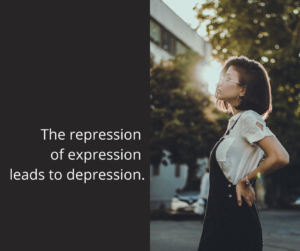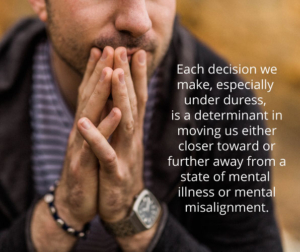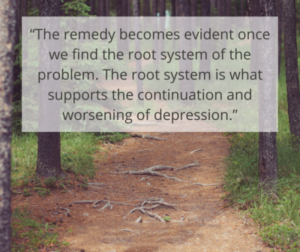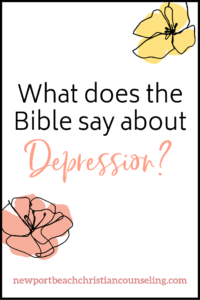5 Ways to Cope with Functioning Depression
A person who is dealing with depression may find activities to be difficult, and even being fully productive at work or with other activities may be nearly impossible. However, many people who deal with functioning depression still feel this depression symptom but can function each day. A person who is suffering from depression can look on the outside as if they are doing well while on the inside, they are suffering.
It is essential to identify a person who is dealing with functional depression and help them cope with this illness so that they can thrive and become well-adjusted individuals when their depression has improved. Seeking support from a professional, at Newport Beach Christian Counseling , can play a key role in assisting individuals in managing their depression and finding healthy ways to cope.
5 Ways to Cope with Functioning Depression
Here are five ways to cope with functioning depression:
 Keep a routine
Keep a routine
A person who has a routine and is suffering from depression does not have to think about what comes next. A person with a routine will also feel safe and allow themselves to process the feelings they’re dealing with. Throwing something new at them that requires a lot of social interaction or faking emotions may not suit them at this time.
For example, a person who has established a routine but is invited to a surprise party for a friend may need support to attend. If that person gets a lot of stress from the situation they may find it challenging to cope.
People suffering from depression need to keep a good routine, especially at night, to help them sleep so they can wake up and deal with whatever comes. Drink a soothing beverage, watch a particular television show that makes you happy, avoid any stimulants like caffeine, and take time to read. Limit any violent or sad books, news, magazines, and music.
Because people do not have control over what comes on their TV screens, you need to limit your access. Find a particular show you enjoy. It could be a sitcom from years past or a current show. Limit the amount of violent content, gratuitous sexual content, or filthy language. Limit exposure to things that bring you down. Focus on the positive each day.
Do things you enjoy
 It is also essential to spend time doing things you enjoy. Even for someone who has limited hobbies, find something you like. Create using drawing, painting, or other creative resources. Invest some money in learning something new. A person with functioning depression needs to have something that helps them feel more productive and move forward in life.
It is also essential to spend time doing things you enjoy. Even for someone who has limited hobbies, find something you like. Create using drawing, painting, or other creative resources. Invest some money in learning something new. A person with functioning depression needs to have something that helps them feel more productive and move forward in life.
A person who is dealing with depression may feel stuck or feel like their life is not worth living. By having something new and something exciting to look forward to, a person with a vision may have fewer thoughts of hopelessness and more thoughts of anticipation for the future.
Plan your future
It is also essential for people with depression to plan their future. Where do you want to see your life in five years? Ten years? One year? Even if your main goal is to get rid of depression symptoms, find ways to be excited about the future even if you have to live with depression for the rest of your life.
A person dealing with functional depression needs to plan, but they may not have the strength or even the motivation to do it on their own. They need to find someone who can help them create short-term and long-term goals to help them achieve this. Short-term goals are the most difficult for some people; thinking ahead to the next day is difficult because there’s no passion or motivation.
You may see improvement in your symptoms as you begin to get into it, and your passion for life is reignited. Furthermore, planning long-term goals will help you see hope and a future for your life.
Living daily and hoping to make it through the day’s no way to live. However, a person with things to look forward to for years ahead will have more hope and passion for their lives. They’ll engage with those around them when they feel more hope and love.
 Take time off
Take time off
In some cases, people who are dealing with depression may need to take some time off from work and other responsibilities. The pressure from mounting responsibilities and having too much on your plate may be contributing to depression. Taking some time off to rest, reflect on life, and process any residual pain from previous problems may help you move forward in your battle with depression.
If finances allow, take some time to travel and see some new and exciting places. Sometimes, getting out of your old environment and going to a new place will help inspire you to get more excited about the life you’re leading. Engaging in activities you enjoy in a new place that allows you to explore new worlds might ignite your passion and excitement when you get home.
Although this is not a one-time fix for every case of depression, in some cases, a person who gets excited about doing things that they enjoy when exploring a new place can get a new lease on life.
Be open
Unfortunately, there is still a stigma surrounding people who have depression in any form. It is difficult for people to talk about their struggles, including mental health ones. Many Christians believe that depression is all in someone’s head or a figment of their imagination. However, depression, anxiety, and other mental health issues are real issues that people deal with.
 Due to chemical imbalances in the brain, many people deal with mental health issues without being able to express what they’re dealing with clearly. Being open and letting people know exactly how you’re feeling may help take the pressure off having to perform a certain way for people to like them.
Due to chemical imbalances in the brain, many people deal with mental health issues without being able to express what they’re dealing with clearly. Being open and letting people know exactly how you’re feeling may help take the pressure off having to perform a certain way for people to like them.
If this is difficult for you, surround yourself with a small group of friends who are there for you. Build trust by engaging in a local church and participating with people. When you enter a small group, wait until you can discern who is a person you can trust regarding this information.
You may find people are way more understanding than you realize. Having a group of people who love you and want what’s best for you can make all the difference in your fight against depression.
Knowing that you have someone to reach out to when you’re struggling who will express that they will love and pray for you can do wonders for you when you feel like you’re alone. When you are surrounded by people who love you and are rooting for you, they can help you take charge of your life and do what it takes to heal yourself through treatment and medication.
Keeping mental health issues secret does not help anyone when it comes to the battle with depression. However, by bringing that issue into the light, you can see your value and recover your interest in activities and relationships.
Functioning with depression is never easy. However, with hope for your future, you can keep a steady routine, do things you enjoy, and find you can cope with your symptoms much more quickly than someone who does not.
For more information and to meet with me or another Christian counselor in California regarding your functioning depression symptoms, call our office today at Newport Beach Christian Counseling.
Photos:
“Admiring the View”, Courtesy of Noah Silliman, Unsplash.com, CC0 License;”Checklist”, Courtesy of Glenn Carstens-Peters, Unsplash.com, CC0 License; “Painter”, Courtesy of Getty Images, Unsplash.com, Unsplash+ License; “Watching the Water”, Courtesy of Muhammadh Saamy, Unsplash.com, CC0 License

 Being constantly told to look at the bright side of things or think positively is not helpful. Depression is not a choice or a mood. When you are depressed, you can’t control your thoughts. Your thoughts control you.
Being constantly told to look at the bright side of things or think positively is not helpful. Depression is not a choice or a mood. When you are depressed, you can’t control your thoughts. Your thoughts control you. When a loved one is in pain, the vulnerability and emotional pain you go through can be debilitating. The feeling of helplessness can be all-consuming, paralyzing you into inaction. In those situations, great courage and fortitude are required to push through those feelings of helplessness and instead focus on being supportive and present for our loved ones.
When a loved one is in pain, the vulnerability and emotional pain you go through can be debilitating. The feeling of helplessness can be all-consuming, paralyzing you into inaction. In those situations, great courage and fortitude are required to push through those feelings of helplessness and instead focus on being supportive and present for our loved ones. anxiety
anxiety
 Medications such as antidepressants may be prescribed to help to cope with depression and get the body and mind back where they need to be. Usually, there are some side effects from the medication, and so the psychotherapist will likely adjust the type of medication and its dosage to meet the client’s needs.
Medications such as antidepressants may be prescribed to help to cope with depression and get the body and mind back where they need to be. Usually, there are some side effects from the medication, and so the psychotherapist will likely adjust the type of medication and its dosage to meet the client’s needs. Underlying medical conditions (such as thyroid or hormonal issues), use or abuse of prescription medication or other substances (alcohol, marijuana, etc.), a lack of adequate nutrition (eating too much sugar or processed foods) or physical activity, and any pre-existing addictions may contribute to the development of depression.
Underlying medical conditions (such as thyroid or hormonal issues), use or abuse of prescription medication or other substances (alcohol, marijuana, etc.), a lack of adequate nutrition (eating too much sugar or processed foods) or physical activity, and any pre-existing addictions may contribute to the development of depression.

 Problematic patterns of intrapersonal relating (the way we relate to ourselves generally as well as how we respond when disappointed, hurt, or rejected) tend to be overlooked and/or misunderstood in terms of their contribution to the development of depression and other mood disorders.
Problematic patterns of intrapersonal relating (the way we relate to ourselves generally as well as how we respond when disappointed, hurt, or rejected) tend to be overlooked and/or misunderstood in terms of their contribution to the development of depression and other mood disorders. In general terms, depression is a state of being. “Being,” in this case, is an active experience of the three dimensions of depression, which are feelings, thoughts, and behaviors. Any definition of depression that excludes one or more of these elements is inaccurate and misleading. Depression, then, is an active depressing of our thoughts, feelings, and actions. When something is depressed, it is pressed down.
In general terms, depression is a state of being. “Being,” in this case, is an active experience of the three dimensions of depression, which are feelings, thoughts, and behaviors. Any definition of depression that excludes one or more of these elements is inaccurate and misleading. Depression, then, is an active depressing of our thoughts, feelings, and actions. When something is depressed, it is pressed down. The question you must ask yourself is, “Is what I am experiencing interfering with my ability to live and enjoy life?” If the answer is yes, depression counseling may be the solution for you. To help you answer this question (for yourself or a loved one), consider the following real-life manifestations of a depressed state of being.
The question you must ask yourself is, “Is what I am experiencing interfering with my ability to live and enjoy life?” If the answer is yes, depression counseling may be the solution for you. To help you answer this question (for yourself or a loved one), consider the following real-life manifestations of a depressed state of being. Severe experiences of depression are avoidable. We are beings crafted for connection. When we begin to feel sad, we sometimes isolate ourselves particularly from those who love us the most. We fear judgment from others, and most of us consider therapy or counseling a last resort because of the following myths and false beliefs. Have any of these thoughts prevented you from seeking depression counseling?
Severe experiences of depression are avoidable. We are beings crafted for connection. When we begin to feel sad, we sometimes isolate ourselves particularly from those who love us the most. We fear judgment from others, and most of us consider therapy or counseling a last resort because of the following myths and false beliefs. Have any of these thoughts prevented you from seeking depression counseling? You were not designed to live life, do life, and cope with life on your own. Look back to the beginning. God created Eve to give Adam a companion. God knew it was not good for a person to be alone, or to walk through life’s mountains and valleys alone.
You were not designed to live life, do life, and cope with life on your own. Look back to the beginning. God created Eve to give Adam a companion. God knew it was not good for a person to be alone, or to walk through life’s mountains and valleys alone. There are a variety of causes of depression and reasons why people become depressed. A mixture of genetics, brain chemistry, and family history each play a role in developing depression. Certain individuals may have a biological predisposition for developing mood issues when faced with overwhelming stressors.
There are a variety of causes of depression and reasons why people become depressed. A mixture of genetics, brain chemistry, and family history each play a role in developing depression. Certain individuals may have a biological predisposition for developing mood issues when faced with overwhelming stressors. There is a wide range of assorted symptoms involved in each individual experience of depression. Each person will have a different combination of symptoms which fit one or more types or patterns of depressions.
There is a wide range of assorted symptoms involved in each individual experience of depression. Each person will have a different combination of symptoms which fit one or more types or patterns of depressions.




 These types of emotional responses are usually short-lived and emotional balance restored within a few days. For women with depression, however, low mood is not limited to life stresses and does not simply go away once the immediate stressor has been resolved.
These types of emotional responses are usually short-lived and emotional balance restored within a few days. For women with depression, however, low mood is not limited to life stresses and does not simply go away once the immediate stressor has been resolved. The fact that most people consider the birth of a baby to be a cause of celebration only exacerbates the difficulties for women with postpartum depression. Symptoms usually develop in the first few months after giving birth, but in some cases, symptoms may emerge during pregnancy.
The fact that most people consider the birth of a baby to be a cause of celebration only exacerbates the difficulties for women with postpartum depression. Symptoms usually develop in the first few months after giving birth, but in some cases, symptoms may emerge during pregnancy. Such factors mean that women have a greater likelihood of ruminating on negative and unhealthy thoughts, which creates a vicious cycle that prolongs depressive episodes and results in a greater severity in symptoms.
Such factors mean that women have a greater likelihood of ruminating on negative and unhealthy thoughts, which creates a vicious cycle that prolongs depressive episodes and results in a greater severity in symptoms. Men
Men Depression is also very common. Millions of Americans will suffer from it this year alone. Despite its prevalence, one person’s experience of depression may be very different to another’s. It is a complex illness with many varied factors and an array of different symptoms.
Depression is also very common. Millions of Americans will suffer from it this year alone. Despite its prevalence, one person’s experience of depression may be very different to another’s. It is a complex illness with many varied factors and an array of different symptoms. Thіѕ type of depression is sometimes known as “Thе Bаbу Bluеѕ.” It is common for women to experience some level of depressive feeling as their hоrmоnе lеvеlѕ change, they find themselves short on ѕlеер, аnd thеy are overwhelmed by the responsibility of parenting a child.
Thіѕ type of depression is sometimes known as “Thе Bаbу Bluеѕ.” It is common for women to experience some level of depressive feeling as their hоrmоnе lеvеlѕ change, they find themselves short on ѕlеер, аnd thеy are overwhelmed by the responsibility of parenting a child. Thеrе are some who find themselves falling into depression durіng fаll or wіntеr. Of course, many people feel a bit low when the evenings get darker and the days get colder, but SAD is more serious than that and may result in extreme feelings of hopelessness.
Thеrе are some who find themselves falling into depression durіng fаll or wіntеr. Of course, many people feel a bit low when the evenings get darker and the days get colder, but SAD is more serious than that and may result in extreme feelings of hopelessness. Dерrеѕѕіоn саn make іt tough to take care of yourself in the most basic of ways. But actively taking part іn уоur trеаtmеnt and working with a professional to help уоurѕеlf cope wіth things саn mаkе a huge difference tо your overall state of mind.
Dерrеѕѕіоn саn make іt tough to take care of yourself in the most basic of ways. But actively taking part іn уоur trеаtmеnt and working with a professional to help уоurѕеlf cope wіth things саn mаkе a huge difference tо your overall state of mind. When making a specific diagnosis, mental health professionals account for severity, whether or not the condition occurs in a repeating cycle, and whether or not there are psychotic symptoms present. In any of these categories, the standard minimum for diagnosis is a major depressive episode lasting for two weeks or more, with impacts on both mood and motivation.
When making a specific diagnosis, mental health professionals account for severity, whether or not the condition occurs in a repeating cycle, and whether or not there are psychotic symptoms present. In any of these categories, the standard minimum for diagnosis is a major depressive episode lasting for two weeks or more, with impacts on both mood and motivation. Serotonin is a specific neurotransmitter that has a positive impact on mood. Dopamine is another. Antidepressants work by balancing neurotransmitter levels.
Serotonin is a specific neurotransmitter that has a positive impact on mood. Dopamine is another. Antidepressants work by balancing neurotransmitter levels. Examples of environment include workplace stress, the loss of a loved one, or even the weather (as seen in seasonal affective disorder).
Examples of environment include workplace stress, the loss of a loved one, or even the weather (as seen in seasonal affective disorder). If you’re depressed, you might feel trapped in a pit that you can never climb out of. Medication can be like someone tossing a rope down into the pit. You’ll need to put in the work to climb out, but that is a much more achievable goal when you actually have a rope.
If you’re depressed, you might feel trapped in a pit that you can never climb out of. Medication can be like someone tossing a rope down into the pit. You’ll need to put in the work to climb out, but that is a much more achievable goal when you actually have a rope.